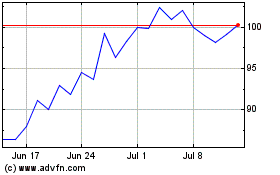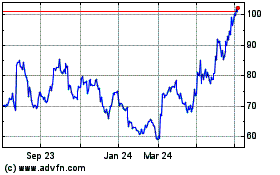UPDATE: Vodafone CEO Total Compensation In 2012 Almost GBP14 Million
June 01 2012 - 10:50AM
Dow Jones News
Vittorio Colao, chief executive of Vodafone Group PLC, (VOD.LN)
will earn almost GBP14 million during 2012 in salary, bonus,
benefits and share options, the company's annual report Friday
shows, although the company's net profit fell by 13% in the fiscal
year to March 31 2012.
The pay package -- one of the largest among U.K. chief
executives this year -- is unlikely to provoke the levels of
shareholder ire that have led some FTSE chief executives to quit
their jobs amid pay rows. Vodafone has broadly outperformed its
peers in terms of its shareholder return during the period of
Colao's stewardship and the company's share price hasn't plunged
this year like some other U.K. stocks. It may nevertheless be
scrutinized by investors in no mood for excessive payouts.
The bulk of Colao's compensation is accounted for by share
options worth almost GBP11 million, which vest in June of this year
and which cover a three-year period starting from 2009. Colao has,
however, committed to hold on to all of the vesting shares for an
additional two years. Colao will also receive a salary of GBP1.09
million, up 5% from GBP1.04 million in 2011, although his bonus has
fallen by 21% to GBP1.03 million
The world's biggest mobile operator by revenue in May reported a
13% fall in annual net profit, dragged down by sluggish spending in
southern Europe's troubled economies.
Vodafone said in May that its net profit for 2012 fell to
GBP6.96 billion for the year ended March 31 from GBP7.97 billion a
year earlier.
Vodafone has awarded Colao the maximum share-based payout
because the company achieved the metrics required to hit the
payout, a spokesman said. These include free cashflow generation
and total shareholder return compared with peer group
companies.
Vodafone, in its annual report, points out that it has paid out
over GBP19 billion in dividend payments in the period since 2008,
and generated free cashflow of nearly GBP21 billion, in excess of
its own free cashflow targets.
The past few months have seen a spate of disputes between
companies and institutional investors in the U.K., which have led
to a number of high profile resignations and some changes to
corporate remuneration policies.
Nearly a third of shareholders in Barclays PLC (BARC.LN) voted
to oppose the company's pay package at the company's annual general
meeting in April. Bob Diamond, chief executive, was paid GBP6.3
million in salary and bonus for 2011, in addition to a GBP5.7
million tax payment on his behalf by the company.
Aviva PLC (AV.LN) chief Andrew Moss last month was forced to
quit immediately after a shareholder revolt following a year of
underperformance. Moss' departure followed that of Trinity Mirror
PLC's (TNI.LN) chief executive, Sly Bailey, and David Brennan at
U.K. drug giant AstraZeneca PLC (AZN.LN), all three quitting as
investor anger centers on executive pay perceived as excessive in
the light of company underperformance.
Vodafone gets a large chunk of its profits from countries now
considered at risk because of the ongoing eurozone crisis. These
include its markets in Italy which represents 17% of company
earnings before interest, tax, depreciation and amortization; Spain
which accounts for 8%; Portugal 3%; and Ireland and Greece which
contribute a combined 3%.
In addition to the GBP4 billion aggregate impairment charge for
these countries identified at year end, Vodafone said it has taken
action to reduce its exposure in these countries. For example, it
has reduced counterparty limits with certain financial institutions
and converted a significant proportion of euro denominated holdings
and deposits into sterling and U.S. dollar investments; made some
changes to its bulk-buying contracts across the group; and ensured
that it can switch to a more cash-based model in the event banking
systems are frozen with adequate access to alternative
currencies.
The company hasn't made any financial provisions for future
liabilities arising from the collapse of the eurozone or the exit
of any country from the eurozone.
-By Jessica Hodgson and Marietta Cauchi, Dow Jones Newswires;
+44207 8429373; jessica.hodgson@dowjones.com.
Reach (LSE:RCH)
Historical Stock Chart
From Mar 2024 to Apr 2024

Reach (LSE:RCH)
Historical Stock Chart
From Apr 2023 to Apr 2024
